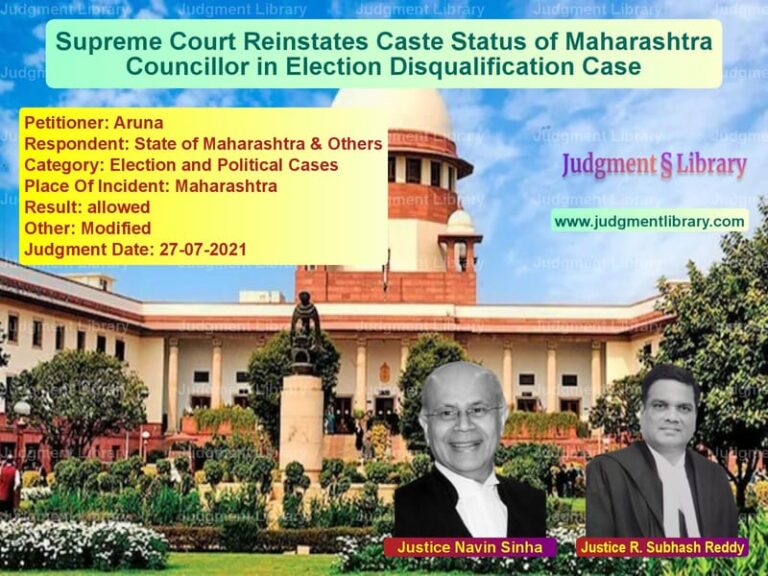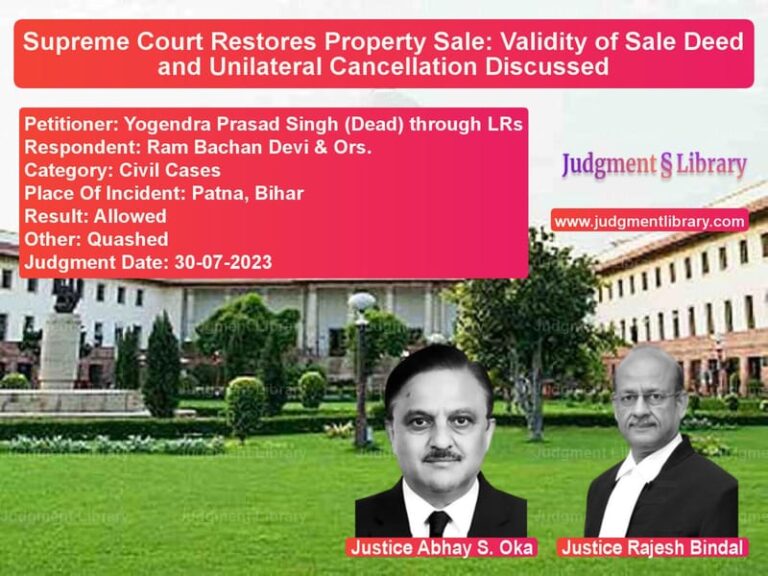False Promise of Marriage and Consent: Supreme Court Quashes Rape Charges
The case of Lalu Yadav vs. The State of Uttar Pradesh & Ors. revolves around the legal interpretation of consent in the context of alleged rape under a false promise of marriage. The Supreme Court of India, in its judgment dated October 16, 2024, quashed the FIR and proceedings against the appellant, holding that the allegations in the complaint did not constitute a prima facie case of rape under Section 376 of the Indian Penal Code (IPC). This judgment clarifies the legal position on consensual relationships and the misuse of false promise allegations in criminal cases.
Background of the Case
The case originates from an FIR lodged on February 21, 2018, at Police Station Nandganj, District Ghazipur, Uttar Pradesh. The complaint was filed by the alleged victim (Respondent No. 4), who accused the appellant, Lalu Yadav, of establishing physical relations with her over a period of five years under the pretext of marrying her. The allegations included multiple instances of sexual intercourse and two forced abortions, which led to the registration of the case under Sections 376 (rape) and 313 (causing miscarriage without woman’s consent) of the IPC.
Petitioner’s Arguments
- The appellant argued that the relationship was consensual, and the complainant willingly engaged in the physical relationship while addressing him as her husband.
- There was an unexplained delay of over five years in filing the complaint, which raised serious doubts about its authenticity.
- The FIR itself stated that the complainant’s parents were aware of the relationship, and she had willingly traveled with the appellant multiple times, including staying in hotels in Varanasi.
- The allegations of forced abortion were unsubstantiated and had already been dropped by the investigating agency.
- The complaint was motivated by personal grudges and filed with malicious intent to harass the appellant after he secured employment.
Respondents’ Arguments
- The complainant argued that she was misled into the relationship under the false assurance of marriage.
- She stated that the appellant had repeatedly deceived her and exploited her emotionally and physically.
- Despite knowing that he would not marry her, the appellant continued to establish physical relations, which amounted to rape under Section 376 IPC.
- The High Court was correct in refusing to quash the FIR at the initial stage and allowing the investigation to proceed.
Supreme Court’s Observations
- The Court emphasized that there was a clear contradiction in the complainant’s statement: she claimed that she was forced into a relationship but also admitted that they lived together as husband and wife.
- The delay of five years in filing the complaint was deemed excessive and unexplained, raising serious doubts about the veracity of the allegations.
- The complainant had engaged in a long-term consensual relationship with the appellant, which could not be retrospectively classified as rape.
- The allegations regarding forced abortion were already found to be unsubstantiated by the investigating agency.
- The Court reiterated its previous rulings that an adult woman who willingly engages in a physical relationship cannot later claim rape merely because the relationship did not culminate in marriage.
Supreme Court’s Ruling
- The FIR and all proceedings against the appellant were quashed.
- The High Court’s refusal to quash the FIR was set aside.
- The Court held that the case did not meet the threshold for prosecuting the appellant under Section 376 IPC.
- The ruling emphasized the need to differentiate between genuine cases of rape and relationships that end in disappointment.
Legal Implications of the Judgment
This judgment sets an important precedent regarding false promise of marriage and consent in sexual relationships:
- Protection Against Misuse of Rape Laws: The ruling ensures that false cases filed with malicious intent do not lead to wrongful prosecutions.
- Clarification on Consent: A long-term consensual relationship cannot be retrospectively converted into a rape allegation merely due to non-fulfillment of a promise to marry.
- Judicial Review in Criminal Cases: Courts have the power to quash FIRs where allegations do not constitute an offense under the law.
Conclusion
The Supreme Court’s decision in this case reinforces the importance of protecting individuals from false allegations while upholding the sanctity of laws meant to protect genuine victims of sexual offenses. The ruling ensures that criminal law is not misused for personal vendettas and provides clarity on the distinction between consensual relationships and coercion.
Read also: https://judgmentlibrary.com/supreme-court-quashes-conviction-in-fake-caste-certificate-case/
Petitioner Name: Lalu Yadav.Respondent Name: The State of Uttar Pradesh & Ors..Judgment By: Justice C.T. Ravikumar, Justice Rajesh Bindal.Place Of Incident: Ghazipur, Uttar Pradesh.Judgment Date: 16-10-2024.
Don’t miss out on the full details! Download the complete judgment in PDF format below and gain valuable insights instantly!
Download Judgment: lalu-yadav-vs-the-state-of-uttar-p-supreme-court-of-india-judgment-dated-16-10-2024.pdf
Directly Download Judgment: Directly download this Judgment
See all petitions in Bail and Anticipatory Bail
See all petitions in Fraud and Forgery
See all petitions in Legal Malpractice
See all petitions in Judgment by C.T. Ravikumar
See all petitions in Judgment by Rajesh Bindal
See all petitions in allowed
See all petitions in Quashed
See all petitions in supreme court of India judgments October 2024
See all petitions in 2024 judgments
See all posts in Criminal Cases Category
See all allowed petitions in Criminal Cases Category
See all Dismissed petitions in Criminal Cases Category
See all partially allowed petitions in Criminal Cases Category







